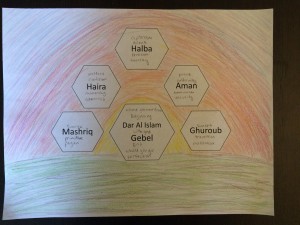The Adventure of Ibn Fattouma Response
The story of Ibn Fattouma was an allegory for many things: society as a whole, each persons individual journey in life. He goes from Dar Al Islam, to Gebel with five steps in between: Mashriq, Haira, Halba, Aman, Ghuroub. Each of these represents a different part of life, or of civilization. I drew this as a sunrise, with the beginning and the end as the sun itself, and the five steps as a cycle. I wrote some of the many connections and associations we came up with in class for each of the steps. Dar Al Islam was the beginning and from there comes Mashriq, which means sunrise. Mashriq is the beginning of civilization, as pagan and primitive, or the beginning of life. Haira is next and means confusion. This was a time of monarchy, war, and wealth. We compared this to Saudi Arabia or England. This is a step above primitive Mashriq, but not quite a functioning society. Next is Halba, meaning arena, where there is freedom of and from religion, and of sexual relationships. All this freedom leads to anarchy. We compared this sort of capitalism to Western societies, such as America and France. Aman means safety or peace and was a communist community that valued security and justice over individualism, like Russia. Last is Ghuroub, meaning sunset, and ties back to the allegory of this adventure as a life. This is the meditative transition before you die, and before you go to Gebel. We don’t know much about Gebel, because as a society, we aren’t there yet, and as a life cycle, it is death, and no one comes back to tell us about it. It’s a time of perfection when you’re with god.
